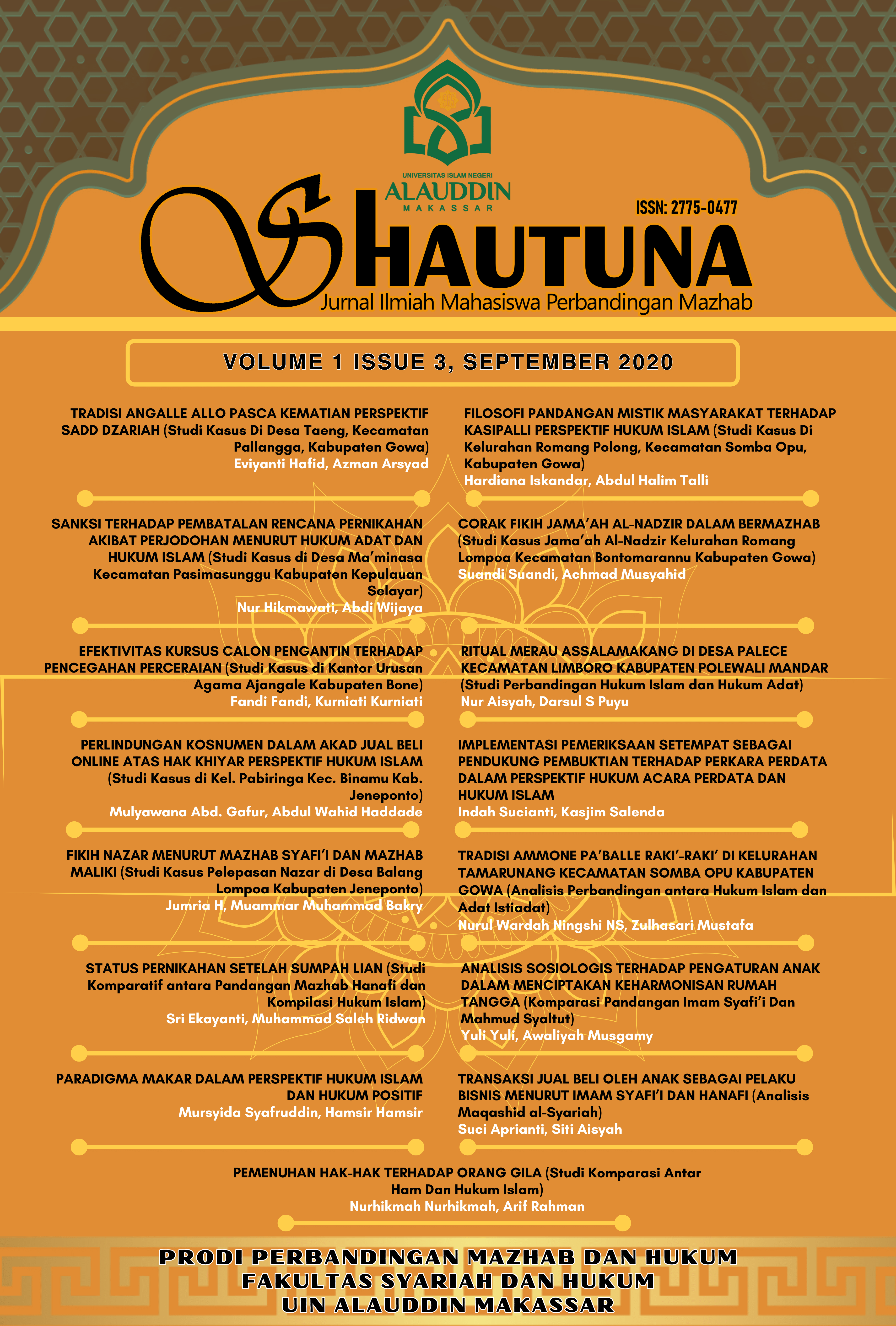TRADISI ANGALLE ALLO PASCA KEMATIAN PERSPEKTIF SADD DZARIAH (Studi Kasus Di Desa Taeng, Kecamatan Pallangga, Kabupaten Gowa)
Abstract
Abstract
This study discusses the main issues related to Sadd Dżariah's views in the Angalle Allo tradition in Taeng Village, Pallangga District, Gowa Regency. The purpose of this study, namely: This type of research is qualitative where qualitative research produces a descriptive data, so researchers collect data through interviews, observation and documentation. This research approach uses a sociological approach and shar'i approach. As for the informants in this study are community shops, as well as several communities directly involved in this adat procession. The data analysis techniques in this research process are: Data collection, data reduction, data presentation and drawing conclusions. As for Sadd Dżariah's view of the Angalle Alllo tradition which is included in the category of Acts which is basically permissible because it contains benefits, but allows for interpretations. What is meant by actions that are basically permissible are, carrying out good traditions in accordance with the teachings of Islam contained in QS Al-A'raf / 7 Paragraph 199, gathering together to eat where there is blessing and reciting verses of the Holy Qur'an ' where the reward is very useful for people who have died. While allowing the occurrence of the intended interpretations if in carrying out this tradition with the intention to send food to people who have died, making food in this tradition is mandatory so that it troubles the families of people who have died and other forms of activities that are not recommended in Islam.The implication of this research is to explain about Sadd Dżariah's view of the Angalle Allo tradition preserved by the people of Taeng Village to the present. The conclusions above can be a factor for people to preserve this culture in accordance with Islamic teachings based on the Qur'an and Sunnah.
Keywords : Tradition, Angalle All, Death, Sadd Dzariah
References
Daftar Pustaka
Abdul Syatar. “TRANSFORMATION OF FIQH IN THE FORMS OF HAJJ AND ZAKAT LEGISLATION.” Mazahibuna; Jurnal Perbandingan Mazhab 1, no. 2 Desember (2019): 120–133. http://journal.uin-alauddin.ac.id/index.php/mjpm/article/view/11646.
Achmad Musyahid. “DISKURSUS MASLAHAT MURSALAH ERA MILINEAL (Tinjauan Filosofis Terhadap Konsep Maslahat Imam Malik).” Mazahibuna; Jurnal Perbandingan Mazhab 1, no. 2 (2019): 134–145.
Abdussomad, Muhyiddin. Fiqh Tradisional, Jawaban Berbagai Persoalan Keagamaan Sehari-Hari, cet. ke-8. Jember: Pustakan Bayan, 2010.
Abidin, Saenal. “Upacara Adat Kematain di Kecamatan Salomekko Kabupaten Bone”, Skripsi. Makassar: Fakultas Adab dan Humaniora UIN Alauddin, 2010.
Arsip Desa Taeng. Tahun 2019.
Departemen Agama R.I. Al-Qur’an dan Terjemah. Jakarta: Bumi Aksara, 2009.
Esten, Mursal. Transformasi Budaya. Bandung : Angkasa, 1999.
Efendy, Satria. Ushul Fiqh. Jakarta: Kencana Prenada Media Group, 2005.
Gunawan, Ari H. Sosiologi Pendidikan. Jakarta : Rineka Cipta, 2000.
Hadikusuma, Hilman. Pengantar Ilmu Hukum Adat Indonesia . Bandung: Mandar Maju, 1992.
Hakim, Moh Nur. Islam Tradisional Dan Reformasi Pragmatism. Malang : Bayu Media Publishing, 2003.
Hamid Abdullah. Manusia Bugis Makassar: Suatu Tinjauan Historis Terhadap Pola Tingkah Laku dan Pandangan Hidup Manusia Bugis Makassar. Jakarta: Inti Idayu Press, 1985.
Hasbi Ash-Shiddieqy, Teungku Muhammad. Koleksi Hadis-Hadis Hukum. Semarang: Pustaka Rizki Putra, 2011.
Hasmira. “Makna Perayaan Kematian”, Skripsi. Makassar: Fakultas Dakwah dan Komunikasi UIN Alauddin, 2017.
Juamtoro, Totok dan Samsul Munir. Kamus Ilmu Ushul Fikih. Jakarta: Amzah, 2009.
Lukito, Ratno. Pergumulan Antara Hukum Islam dan Adat di Indonesia. Jakarta: INIS, 1998.
Mardenis. Pendidikan Kewarganegaraan. Jakarta: Rajawali Pers, 2016.
Masinambow. Hukum dan Kemajemukan Budaya. Jakarta: Yayasan obor Indonesia, 2003.
Pasinring, Andi Achruh AB. Ilmu Fiqh, Makassar: Syahadah, 2017.
Pasrah AD, Fahmil. “Upacara adat kematian di Desa Salemba Kecamatan Ujung Loe Kabupaten Bulukumba”, Skripsi. Makassar: Fakultas Adab dan Humaniora UIN Alauddin, 2017.
Rahim Abdul dan Anwar Ibrahim. Nilai Demokrasi dalam Budaya Bugis Makassar. Makassar: Dinas Kebudayaan Dan Pariwisata Provinsi Sulawesi Selatan, 2004.
Setiadi, Elly M dkk. Ilmu Sosial Dan Budaya Dasar, cet.v. Jakarta: Kencana, 2009.
Shihab, M. Quraish. Tafsir Al-Misbah, vol.5. Jakarta: Lentera Hati, 2002.
Soekamto, Soejono. Sosiologi Suatu Pengantar. Jakarta: Raja Grapindo Persada, 2006.
Soekamto, Soejono. Sosiologi Suatu Pengantar. Jakarta: Rajawali, 1990.
Sugiyono. Memahami Penelitian. Bandung: CV Alfabeta, 2005.
Sztompka, Piotr. Sosiologi Perubahan Sosial. Jakarta: Prenada Media Grup, 2007.
Tamrin, Dahlan. Kaidah-Kaidah Hukum Islam. Malang: UIN Maliki Press, 2010.
Tanzeh, Ahmad dan Suyitno. Dasar-Dasar Penelitian. Surabaya: Elkaf, 2006.
Wahid, Sugira. Manusia Makassar. Cet. I; Makassar: Pustaka Refleksi, 2007.
Warsito. Antropologi Budaya. Yogyakarta: Penerbit Ombak, 2012.


